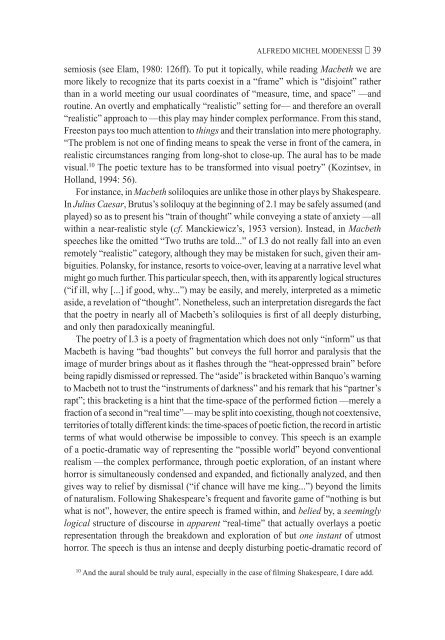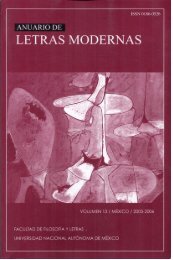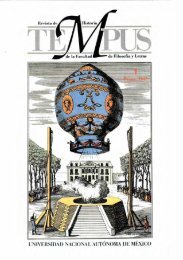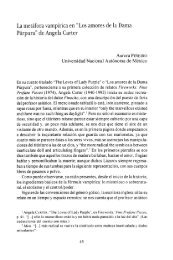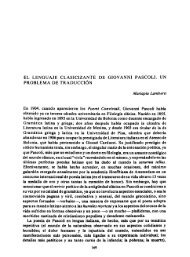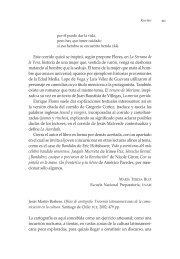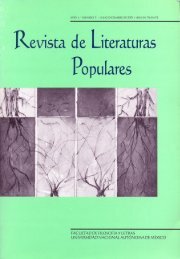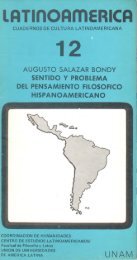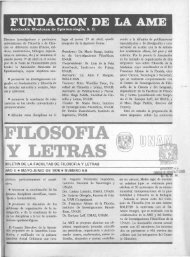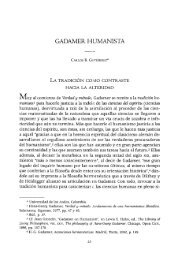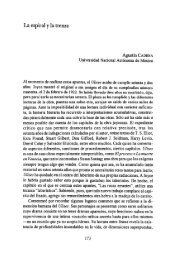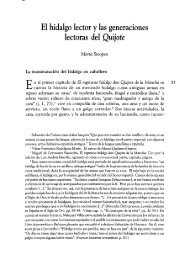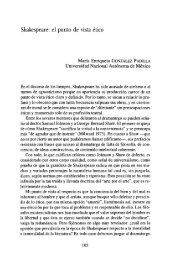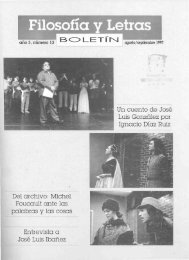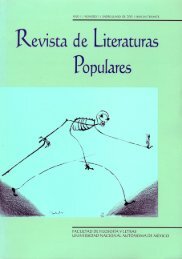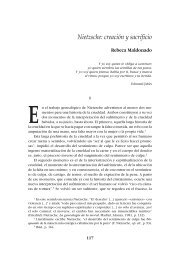Untitled - Repositorio de la Facultad de Filosofía y Letras. UNAM ...
Untitled - Repositorio de la Facultad de Filosofía y Letras. UNAM ...
Untitled - Repositorio de la Facultad de Filosofía y Letras. UNAM ...
Create successful ePaper yourself
Turn your PDF publications into a flip-book with our unique Google optimized e-Paper software.
AlFredO MIchel MO<strong>de</strong>NeSSI 39<br />
semiosis (see E<strong>la</strong>m, 1980: 126ff). To put it topically, while reading Macbeth we are<br />
more likely to recognize that its parts coexist in a “frame” which is “disjoint” rather<br />
than in a world meeting our usual coordinates of “measure, time, and space” —and<br />
routine. An overtly and emphatically “realistic” setting for— and therefore an overall<br />
“realistic” approach to —this p<strong>la</strong>y may hin<strong>de</strong>r complex performance. From this stand,<br />
Freeston pays too much attention to things and their trans<strong>la</strong>tion into mere photography.<br />
“the problem is not one of finding means to speak the verse in front of the camera, in<br />
realistic circumstances ranging from long-shot to close-up. The aural has to be ma<strong>de</strong><br />
visual. 10 the poetic texture has to be transformed into visual poetry” (Kozintsev, in<br />
Hol<strong>la</strong>nd, 1994: 56).<br />
For instance, in Macbeth soliloquies are unlike those in other p<strong>la</strong>ys by Shakespeare.<br />
In Julius Caesar, Brutus’s soliloquy at the beginning of 2.1 may be safely assumed (and<br />
p<strong>la</strong>yed) so as to present his “train of thought” while conveying a state of anxiety —all<br />
within a near-realistic style (cf. Manckiewicz’s, 1953 version). Instead, in Macbeth<br />
speeches like the omitted “two truths are told...” of I.3 do not really fall into an even<br />
remotely “realistic” category, although they may be mistaken for such, given their ambiguities.<br />
Po<strong>la</strong>nsky, for instance, resorts to voice-over, leaving at a narrative level what<br />
might go much further. This particu<strong>la</strong>r speech, then, with its apparently logical structures<br />
(“if ill, why [...] if good, why...”) may be easily, and merely, interpreted as a mimetic<br />
asi<strong>de</strong>, a reve<strong>la</strong>tion of “thought”. Nonetheless, such an interpretation disregards the fact<br />
that the poetry in nearly all of Macbeth’s soliloquies is first of all <strong>de</strong>eply disturbing,<br />
and only then paradoxically meaningful.<br />
the poetry of I.3 is a poety of fragmentation which does not only “inform” us that<br />
Macbeth is having “bad thoughts” but conveys the full horror and paralysis that the<br />
image of mur<strong>de</strong>r brings about as it f<strong>la</strong>shes through the “heat-oppressed brain” before<br />
being rapidly dismissed or repressed. the “asi<strong>de</strong>” is bracketed within Banquo’s warning<br />
to Macbeth not to trust the “instruments of darkness” and his remark that his “partner’s<br />
rapt”; this bracketing is a hint that the time-space of the performed fiction —merely a<br />
fraction of a second in “real time”— may be split into coexisting, though not coextensive,<br />
territories of totally different kinds: the time-spaces of poetic fiction, the record in artistic<br />
terms of what would otherwise be impossible to convey. This speech is an example<br />
of a poetic-dramatic way of representing the “possible world” beyond conventional<br />
realism —the complex performance, through poetic exploration, of an instant where<br />
horror is simultaneously con<strong>de</strong>nsed and expan<strong>de</strong>d, and fictionally analyzed, and then<br />
gives way to relief by dismissal (“if chance will have me king...”) beyond the limits<br />
of naturalism. Following Shakespeare’s frequent and favorite game of “nothing is but<br />
what is not”, however, the entire speech is framed within, and belied by, a seemingly<br />
logical structure of discourse in apparent “real-time” that actually over<strong>la</strong>ys a poetic<br />
representation through the breakdown and exploration of but one instant of utmost<br />
horror. The speech is thus an intense and <strong>de</strong>eply disturbing poetic-dramatic record of<br />
10 And the aural should be truly aural, especially in the case of filming Shakespeare, I dare add.


